
Seasonal Eating Calendar: Creation Tips for Families
Creating a seasonal eating calendar is a practical way for families to enjoy fresh, local…
Slow food practices emphasize the importance of local, seasonal ingredients and mindful consumption, benefiting both individuals and communities. By fostering local economies and enhancing food quality, these practices not only promote sustainable agriculture but also strengthen cultural heritage and community ties. Embracing slow food can lead to improved nutrition and overall well-being, allowing for a deeper connection to the food we eat.

Creating a seasonal eating calendar is a practical way for families to enjoy fresh, local produce while fostering healthier eating habits. By planning meals around seasonal ingredients, families can not only enhance their nutrition but also save money and support local agriculture. Utilizing various tools such as apps and websites can simplify the process, making…

A balanced diet is vital for family nutrition, encompassing a diverse array of foods such as fruits, vegetables, whole grains, and lean proteins. These foods not only provide essential nutrients that promote overall health but also allow for meal variety, catering to different tastes and dietary needs. By incorporating a wide range of foods, families…

Mindful eating is a transformative practice that enhances health outcomes by fostering awareness of food choices and eating habits. By focusing on the sensory experience of meals, individuals can make better dietary decisions while also improving their emotional well-being through a deeper connection with food and enhanced self-awareness. How does mindful eating improve health outcomes?…
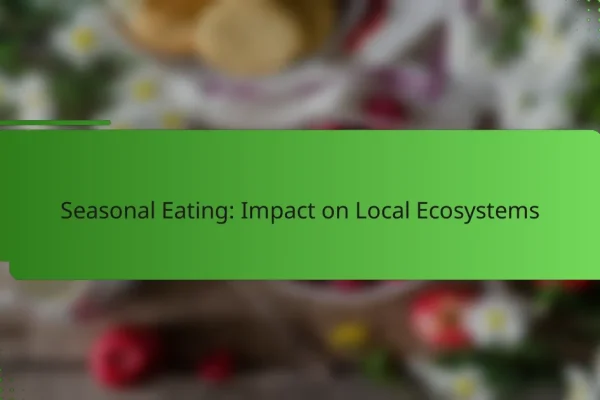
Seasonal eating plays a crucial role in supporting local ecosystems by encouraging sustainable agricultural practices and reducing the environmental impact of food production. By choosing to consume foods that are in season, individuals can bolster local farmers, enhance biodiversity, and lower the carbon footprint linked to food transportation. This practice not only improves the flavor…
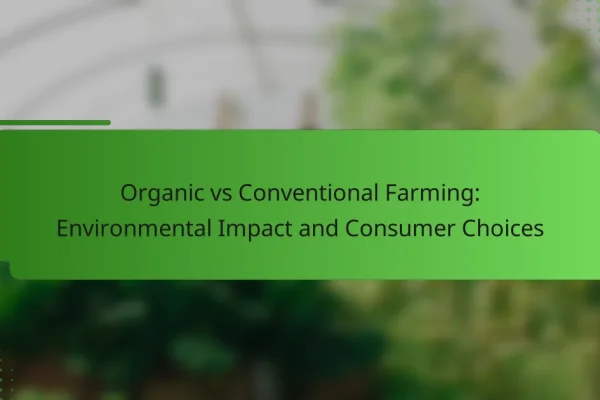
The debate between organic and conventional farming centers on their respective environmental impacts and the choices consumers make. Organic farming promotes sustainable practices that enhance ecosystems and reduce pollution, while conventional farming often leads to soil degradation and resource depletion due to its reliance on synthetic chemicals. As consumer preferences increasingly favor organic products, these…
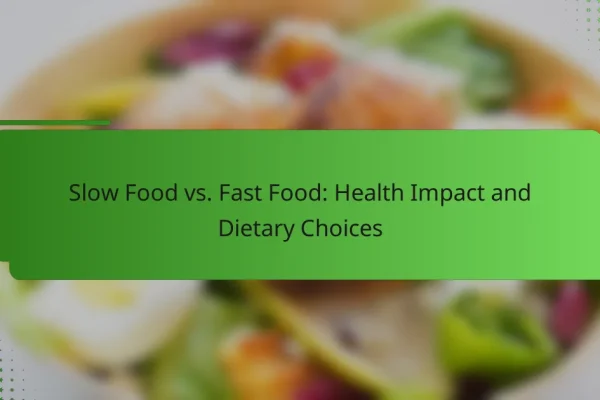
The debate between Slow Food and Fast Food highlights significant differences in health impact and dietary choices. Slow Food promotes the consumption of fresh, whole ingredients, which can lead to better health outcomes, while Fast Food often relies on processed options that prioritize convenience. By making informed choices and prioritizing minimally processed foods, consumers can…

Local farmers are essential to the economic vitality of their communities, generating jobs and boosting local sales while reducing transportation costs. As consumer support for fresh and sustainable produce increases, these farmers not only enhance food accessibility but also foster community growth and resilience, creating a stronger sense of belonging among residents. How do local…
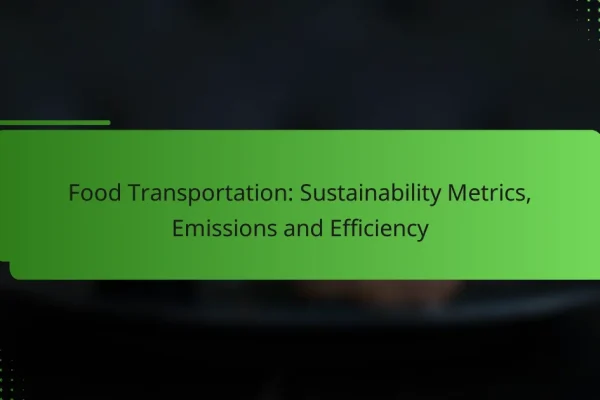
Food transportation plays a crucial role in the sustainability of the supply chain, with significant potential to reduce emissions through cleaner technologies and efficient practices. By focusing on sustainability metrics such as carbon footprint and energy consumption, companies can identify improvement areas and adopt innovations like electric vehicles and optimized routing software to enhance operational…

Personalized meal plans are designed to meet individual wellness goals, nutritional needs, and family preferences, making them powerful tools for enhancing overall health. By focusing on specific objectives like weight loss or increased energy, these tailored plans promote sustainable lifestyle changes while ensuring that meals are enjoyable and suitable for all family members. How can…
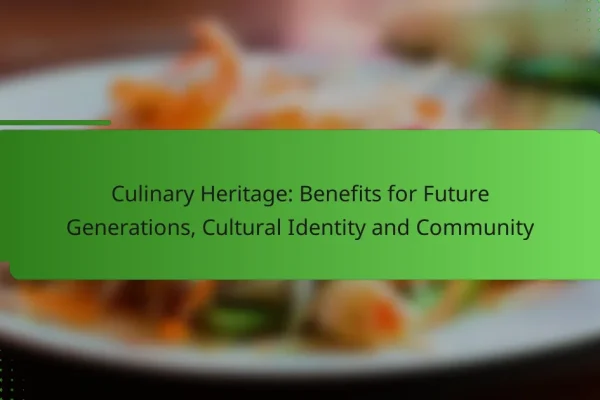
Culinary heritage serves as a vital link between past and future generations, preserving traditional food practices that promote sustainability and enhance nutritional knowledge. By fostering a sense of belonging and cultural identity, it connects individuals within a community, encouraging collaboration and social cohesion through shared meals and cooking techniques. This rich tapestry of culinary traditions…
Slow food practices benefit communities in the United States by fostering local economies, enhancing food quality, and promoting cultural heritage. These practices encourage mindful consumption and support sustainable agriculture, which in turn strengthens community ties and improves overall well-being.
Slow food practices significantly bolster local economies by prioritizing the purchase of food from nearby farmers and producers. This not only keeps money circulating within the community but also creates jobs in agriculture and related sectors.
When consumers choose local products, they often pay a premium, which can lead to better income for farmers. Supporting local markets can also reduce transportation costs and environmental impact, making it a win-win for both the economy and sustainability.
Slow food practices enhance food quality by emphasizing fresh, seasonal, and minimally processed ingredients. This approach often results in more flavorful and nutritious meals, as local produce is typically harvested at peak ripeness.
Additionally, many slow food advocates focus on organic and sustainable farming methods, which can reduce the presence of harmful chemicals in food. Consumers can expect higher standards of food safety and quality when they choose to support slow food initiatives.
Slow food practices promote cultural heritage by celebrating traditional cooking methods and local cuisines. This fosters a sense of identity and community pride, as people reconnect with their culinary roots and share their food traditions.
Participating in slow food events, such as local festivals or farm-to-table dinners, allows communities to showcase their unique flavors and recipes. This not only preserves cultural heritage but also educates younger generations about the importance of their food history.
Slow food practices offer numerous health benefits by promoting fresh, locally sourced ingredients and mindful eating. These practices can lead to improved nutrition, reduced intake of processed foods, and enhanced mental well-being.
Engaging in slow food practices often means choosing whole, unprocessed foods that are rich in nutrients. This approach emphasizes seasonal fruits, vegetables, and grains, which can provide a broader range of vitamins and minerals compared to processed alternatives.
For example, incorporating more fresh produce into meals can significantly increase fiber intake, which is essential for digestive health. Aim for a colorful plate to ensure a variety of nutrients.
Slow food practices encourage cooking at home and using fresh ingredients, which naturally leads to a decrease in the consumption of processed foods. Processed foods often contain high levels of sugars, unhealthy fats, and preservatives that can negatively impact health.
By preparing meals from scratch, individuals can better control their ingredient choices and portion sizes. A simple tip is to plan meals around whole foods, such as grains, legumes, and fresh proteins, to minimize reliance on packaged items.
Mindful eating, a key component of slow food practices, can lead to improved mental health by fostering a deeper connection with food. This practice encourages individuals to savor their meals, which can enhance satisfaction and reduce overeating.
Additionally, cooking and sharing meals with others can strengthen social bonds and provide emotional support. Consider setting aside time each week for family meals or community cooking events to boost both mental and emotional well-being.
Adopting slow food practices at home involves focusing on local, seasonal ingredients and preparing meals with care. This approach emphasizes sustainability, nutrition, and enjoyment of food, allowing you to connect more deeply with what you eat.
Growing your own vegetables is a fundamental aspect of slow food practices. Start with easy-to-grow options like tomatoes, lettuce, or herbs, which can thrive in small spaces or containers. This not only provides fresh produce but also reduces your carbon footprint.
Consider using organic seeds and natural fertilizers to enhance soil health. Regularly tending to your garden can also be a rewarding activity that fosters a deeper appreciation for food.
Shopping at local farmers' markets is a great way to support your community and access fresh, seasonal produce. Look for markets in your area that offer a variety of fruits, vegetables, and artisanal products. This can help you make informed choices about the food you consume.
Engaging with local farmers allows you to learn about their growing practices and the origins of your food. Aim to visit these markets weekly to build relationships and discover new ingredients.
Cooking meals from scratch is central to slow food practices, as it encourages creativity and control over ingredients. Start by planning your meals for the week and selecting recipes that highlight seasonal produce. This can help you reduce reliance on processed foods.
Invest in basic kitchen tools and learn fundamental cooking techniques to enhance your skills. Experiment with different cuisines and flavors to make the cooking process enjoyable and fulfilling.
Slow food practices significantly reduce negative environmental impacts by promoting sustainable agriculture, local sourcing, and mindful consumption. These practices help mitigate climate change, protect ecosystems, and conserve resources.
Slow food practices contribute to a lower carbon footprint by prioritizing local and seasonal ingredients, which reduces transportation emissions. When food is sourced closer to home, it typically requires less energy for shipping and storage.
For example, choosing locally grown produce over imported options can cut carbon emissions by significant margins. Consumers can further reduce their footprint by supporting farmers' markets or community-supported agriculture (CSA) programs.
By emphasizing traditional farming methods and heirloom varieties, slow food practices support biodiversity in agriculture. This approach encourages the cultivation of a wide range of crops, which can help maintain healthy ecosystems and resilient food systems.
Engaging with local farmers who use sustainable practices can enhance biodiversity. Look for farms that avoid monoculture and chemical pesticides, as these methods often harm local wildlife and degrade soil health.
Slow food practices help reduce food waste by promoting mindful consumption and preparation. When individuals focus on quality over quantity, they are less likely to over-purchase and more likely to use all parts of the ingredients they buy.
To minimize waste, consider meal planning and using leftovers creatively. For instance, vegetable scraps can be used to make stocks, and stale bread can be transformed into croutons or breadcrumbs, maximizing the value of every purchase.
Slow food practices emphasize quality, sustainability, and health, contrasting sharply with fast food's focus on speed and convenience. While fast food often relies on processed ingredients and quick preparation, slow food prioritizes fresh, local produce and traditional cooking methods.
Slow food practices prioritize high-quality, fresh ingredients, often sourced from local farms. This approach not only supports local economies but also ensures that food is free from harmful additives and preservatives commonly found in fast food.
Fast food typically uses lower-quality ingredients to reduce costs and increase shelf life. This can lead to a lack of flavor and nutritional value, making slow food a more appealing option for those seeking better taste and health benefits.
Choosing slow food can significantly improve health outcomes due to its focus on whole, unprocessed foods. Meals prepared using slow food principles are generally richer in nutrients and lower in unhealthy fats, sugars, and sodium compared to fast food options.
Fast food is often linked to various health issues, including obesity and heart disease, due to its high calorie and low nutrient content. By opting for slow food, individuals can make healthier dietary choices that promote long-term wellness.
Slow food practices contribute to environmental sustainability by promoting local sourcing and seasonal eating. This reduces the carbon footprint associated with transporting food over long distances and supports biodiversity by encouraging the use of native crops.
In contrast, fast food chains often rely on mass-produced ingredients that can lead to environmental degradation, including deforestation and soil depletion. By choosing slow food, consumers can play a role in protecting the environment and supporting sustainable agricultural practices.
Slow food enthusiasts can access a variety of resources to deepen their understanding and practice of slow food principles. These include organizations, online platforms, and local community groups that promote sustainable food practices, local sourcing, and culinary traditions.
Slow Food USA is a prominent organization dedicated to promoting the slow food movement across the United States. It focuses on advocating for local food systems, sustainable agriculture, and preserving traditional food cultures.
Members of Slow Food USA gain access to a wealth of resources, including educational materials, events, and networking opportunities. The organization also supports local chapters, allowing enthusiasts to connect with like-minded individuals in their communities.
To get involved, consider joining a local chapter or participating in events such as farm tours, cooking classes, and food festivals. Engaging with these activities can enhance your appreciation for local food and its cultural significance.